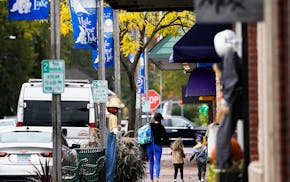Anna Bloomstrand has seen crime ebb and flow in the nine years she has helped run the family business Ingebretsen's on a bustling part of E. Lake Street in south Minneapolis.
More recently, she said, it seems to be getting worse. More needles to pick up, more drug dealers and prostitutes, more people passed out on the street.
It's just one of several parts of Minneapolis seeing an increase in what's often called "livability" crimes. Now, seven business improvement groups across the city want Hennepin County Chief Judge Ivy Bernhardson to sign off on police arrests for drinking in public and loitering with an open bottle — violations that currently only merit a ticket.
"When someone is standing out in front of your home or business completely wasted out of their minds, and there's nothing you can do for them, it makes it difficult to create an environment to move forward together," Bloomstrand said.
But the request is stirring fierce opposition from advocates for the homeless and the Hennepin County Public Defender's office, who say that it will only result in more arrests of the poor, homeless and people of color — increasing a disparity that already exists in the criminal justice system.
"I think it's discriminatory," said Mary Moriarty, Hennepin County's chief public defender. "These two offenses have everything to do with poor people and homeless people."
Steps to make those two crimes subject to arrest have been stalled. Now Minneapolis City Attorney Susan Segal wants to meet with stakeholders to figure out a compromise that addresses how to treat chronic alcoholics and addicts while helping out business owners. She expects that meeting to happen sometime this month.
If police can make arrests for those lower-level crimes, she said, it would do little to address the livability problems if more isn't done.
"The question is: How do we resolve the underlying problems?" she said.
'It might stop'
In downtown Minneapolis, Warehouse District Business Association executive director Joanne Kaufman worries about what she says is an increase in belligerent drunks. When police can only give them a ticket, she said, "there's no teeth."
"If you're taking them to jail, it might stop," she said.
The head of the Minneapolis Downtown Improvement District, a business-funded nonprofit that employs a workforce of "ambassadors," agrees. In the last year, Steve Cramer said, he's seen and heard too many examples of people falling down drunk in front of businesses.
"These people need help," Cramer said. "Sometimes the criminal justice system is the front door through which we can help people with that."
But most people arrested for public consumption or loitering will only stay a few hours in jail before they're released on a small bail, Segal said. If they can't pay the bail, they'd likely be held for at most two days.
Then, Moriarty said, they'll get a court date a few weeks later, but if they miss it, then they'll get an arrest warrant in addition to higher fees and fines, on top of the ones they were already facing. And if they can't pay those fines, they go to collections, jacking up the bill and making it more difficult to find housing.
And punishing the homeless by putting them in jail won't solve the severe mental health and chemical dependency problems they have, said Gail Dorfman, executive director of St. Stephen's Human Services, which provides homeless outreach. She wants more focus placed on outreach and finding homes.
"Arresting them will only make that more difficult," she said. "The more barriers, roadblocks you put in the way, the harder it is."
Community divided
Corrie Zoll sees both sides of the debate. He's lived and worked for 22 years in the Lake Street area, and for the past 18 months as executive director of In the Heart of the Beast Puppet and Mask Theater. Around his theater, he said, crime cycles up and down and goes with the seasons. When he started the job, he and his staff were worried about the safety of audience members coming to the theater. Then the winter hit and crime went down.
Last summer the crime became so intense that his staff asked to change their work schedules, Zoll said. There were gunshots, open-air prostitution and drug dealing, and frequent harassment on the street. Crime all but stopped when police put up a mobile camera, but that's now gone, Zoll said, and now he worries that violent crimes could follow. Police data from the Third Precinct, which includes East Lake Street, shows that violent crimes have increased 23 percent since 2013.
But even Zoll and his staff are split on the arrest proposal.
"We're at a time in this country where we're very aware that these low-level offenses are not equally enforced across race," Zoll said.
He wants to see more programming that would address poverty in the area rather than punishment.
Bloomstrand, of Ingebritsen's, said she's conflicted about the issue.
"The real problem is there isn't enough focus on dealing with addiction issues and access to resources," she said.
Brandon Stahl • 612-673-4626

Shop the curbs for free on 'Trash to Treasure Day' in White Bear Lake

Longtime Uptown boutique closing in May

Meet the Athena Award winners: 103 female athletes honored by their schools

Lacrosse lists: 21 top players and the school that's No. 1 for boys and girls

